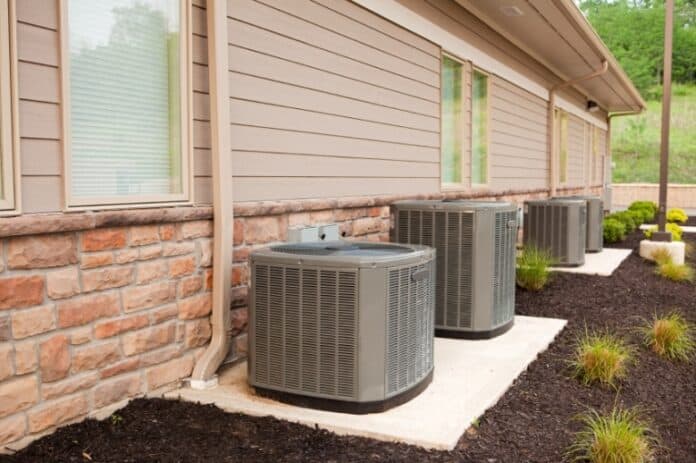In this article, you will be geared with the essential details about the central air conditioner. So keep reading and find out more!
Central air conditioning, known as central AC, is a system wherein air is cooled at a central location and distributed to and from rooms by a fan or more ductwork. It’s quite impressive. Yes, it is! But, if you plan on considering such a kind of air conditioning, you need to learn more about central air conditioners. There is so much for you to consider before installing one at your home, so go through this post!
Table of Contents
So, what is a central air conditioner?
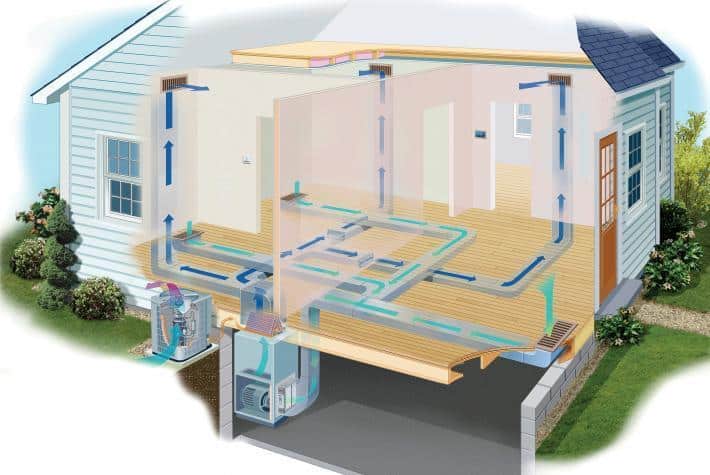
A central air conditioner is compared to a massive refrigerator for your house. It has the same components, systems, and materials as a fridge, which includes a refrigerant that changes from liquid to gas and back to liquid since it travels through a system of tubes and coils or fins that collect and also give off heat.
These central air conditioners are designed to persistently cool the home to the desired temperature of the homeowner. The coolants used are supposed to last the lifetime of a particular air conditioner. However, accidental damage, contaminants, wear and tear, and other issues might spring up. So, these cases might require a charge of coolant once problems are fixed.
Besides, the central air conditioner is a lot more efficient compared to room air conditioners. It is also out of the way, quiet, and a lot more convenient to operate.
Top 5 Best Central Air Conditioners brands
1. Goodman Central Air Conditioners 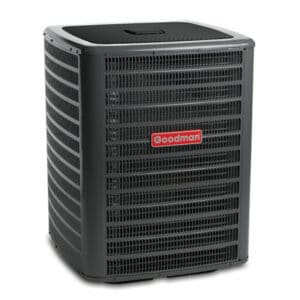
Goodman air conditioners are cost-efficiency, durable, reliable. They are cheaper than competitors in the long term. Godman offers a lifetime limited warranty on most of the parts, including the compressor. Goodman has many models, such as premium unit GSXC18 with incredible SEER 18, premium features, mid-sized models GSXC16, and GSX16 with a lower investment cost. Installation is not the hardest, but it could be too hard to do it yourself, so better to let professionals do the installation job.
Pros
Cons
2. Amana Central Air Conditioners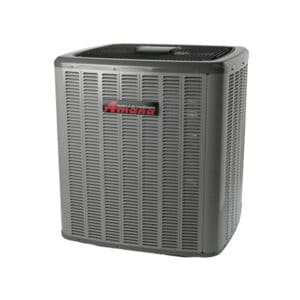
Amana makes one of the most energy-efficient central air conditioners in the market. For example, the ASx14 model is one of the best in class, performing amazingly. Amana units are notably more expensive than competitors; however, the build quality and individual features are excellent. It is pretty easy to install Amana central AC units, but it takes time.
Pros
Cons
3. Lennox Central Air Conditioners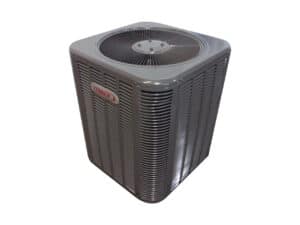
Lennox is definitely among the top 5 central AC brands because of the super high SEER ratings and much better efficiency than any other brand. Their premium unit XC25 has 26 SEER providing super-low running costs. But they are not in the first place because of the price and noise level. The best models to look at – XC25, XC21, and SL18XC1.
Pros
Cons
4. Carrier Central Air Conditioners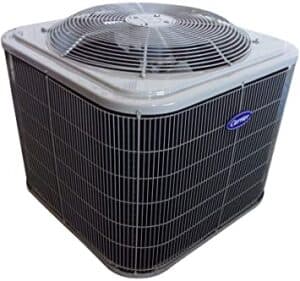
Carrier Central Air Conditioners are the quietest in the market. They use special insulation in their units and a strong frame enclosing the compressor. While other brands’ lowest noise is around 50dB, Carrier’s highest noise level is around 49dB and can be as low as 29dB. Their best unit, Carrier 24VNA0 SEER, is 20.5. It operates very quietly and includes many smart technologies.
Pros
Cons
5. Coleman Central Air Conditioners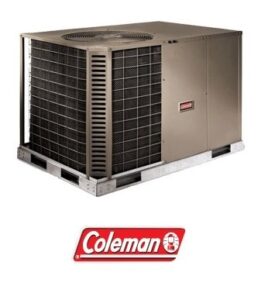
Coleman Central Air Conditioners offers a great price versus performance ratio. They are very durable and have a high SEER. They are less expensive. Noise level is not the loudest, also not the quietest. So, somewhere in the middle ranging between 40 up to 70dB depending on model and operation speed. Installation is not the simplest, but most people don’t install any central air conditioner themselves anyway.
Pros
Cons
What are the types of central air conditioners?
There are two common types of central air conditioner: a split-system unit or a packaged unit.
Split-System Central Air Conditioner
An outdoor metal cabinet has the compressor and condenser in this unit, and the indoor office has the evaporator. The indoor cabinet also contains the furnace or the indoor part of the heat pump. The air conditioner’s evaporator coil is installed in the office or central supply duct of the furnace or the heat pump.
Once you already have the furnace yet no air conditioner, this type of central air conditioner is considered the most economical option to install.
Packaged Central Air Conditioner
On the other hand, in this unit, the condenser, the evaporator, and the compressor are all located in a cabinet, usually placed on a roof or a thick slab next to the house’s foundation. This one is also used in small commercial buildings.
The air supply and return ducts come from indoors through the exterior wall or roof to connect with the packaged air conditioner. And this is usually located outdoors. This unit also includes electric heating coils or a natural gas furnace. The combination of the air conditioner and the central heater eradicates the need for a separate furnace indoors.
How about the parts of a Central Air Conditioner?
It also helps a lot to get a better sense of how the air is cooled if you know the parts that make up the said air conditioning system. For example, a typical central air conditioner might include:
- Its outdoor unit contains the compressor, condenser coil, fan, and electrical components.
- The evaporator coil is installed on top of the gas furnace inside the home.
- There are also a series of pipes or refrigeration lines that connect the outside and inside equipment.
- Ducts also serve as air tunnels to several spaces inside your home.
- There is also a refrigerant or substance.
Benefits of Using Central Air Conditioner
Of course, you’ll gain several benefits out of choosing and installing a central air conditioner. Some of these benefits include the following:
- Cleaner Air. Since the central air conditioning system draws air out of several rooms in the house via air ducts, the air is being pulled through an air filter, removing airborne particles like lint and dust. The sophisticated filters might remove these microscopic pollutants too. Then, the filtered air is routed to air supply duct-work, which carries it back to the room.
- Indoor Comfort on Warm Weather. Central air conditioning could definitely help in keeping your home cool and also reduces the humidity levels.
- Quiet Operation. Since the compressor-bearing unit is located outside your home, the indoor noise level from the operation is a lot slower than the free-standing air conditioning.
Gain those benefits once you prefer to install a central air conditioner.
How do Central Air Conditioners Work?
Most of these central air conditioners have a condenser unit or an air-handling unit with a blower to distribute the cooled air, an evaporator coil, and a ductwork system, which transports the cooled air then removes the warm air.
These condenser units are typically placed outside your home, in an open yet slightly sheltered area. The air handler and the evaporator are both installed in the garage or basement. Or you might as well install them in the attic. And also, the ductwork is routed throughout your house, having the evaporator as the base.
Basically, a central air conditioner is a kind of refrigeration system in the house. It has the basic components, materials, and units that a refrigerator has. In addition, it might include the chemical needed to cool the air or referred to as the refrigerant. This one works by converting from liquid to gas and back to liquid as it travels through the tubes and coils, which collect heat.
Besides, it also gathers hot air from a place to another while replacing the warm air with cold air. And the receiver of the cold air is the part of the unit equipped with the blower to move the cold air to the home entirely.
Cost Expectations: How much does this unit costs?
Depending upon the equipment brands, the size of the system, and the installation requirements, it is estimated that a new whole-house central air conditioner might cost between three to seven thousand dollars. On the other hand, for complicated systems, expect cost as much as 20,000 dollars.
If you have an existing heating system ductwork at home, it will make a difference once utilized. However, even in a house having proper ductwork, it could still cost 3000 to 6000 or more to install a standard central air conditioner. Since the installation depends on several factors, to pinpoint the overall cost of having such an air conditioning system is to get at least three bids from several qualified air conditioning contractors.
On the other hand, installing a conventional ducted system would only make sense if your house is newly built or has a forced-air heating system that this air conditioner could piggyback on. It could be too expensive if you are to retrofit the ductwork that is required for a ducted system in your existing home. Instead, the best options might be a mini-ductless system or room air conditioners, or several windows.
Apart from this, you shouldn’t forget to consider the cost of running this kind of air conditioner. You must not neglect this since the central air conditioner runs on electricity for the fan, blower, and compressor. In addition, we all know that the air conditioner would frequently run during some hot climates, which could push energy costs a lot higher.
You should be aware that the amount of electricity required to run a central air conditioner would depend on two things. And these are the cooling capacity and the energy efficiency being measured by a SEER. So there is a need for you to inquire both about these two before buying one. Please note that the more efficient the air conditioner is, the less it would cost in the long run.
Factors to Consider When Buying a Central Air Conditioning System
If you plan on buying a central air conditioner, then you should take note of the following factors;
SEER Rating
Again, the higher the number means, the more efficient the cooling than a particular unit’s cost. This is referred to as the SEER or the Seasonal Energy Efficiency Ratio, a system for rating the efficiency of an air conditioning system developed by the US Department of Energy.
Each air conditioning has its SEER Rating being displayed on the Energy Star label. You can calculate the SEER rating of an air conditioner by its cooling capacity in BTUs during a particular season, divided by the electric wattage required to cool the air during the same period. And SEER only takes seasonal use into account and not year-round use.
Local Climate
In both humid and hot climates, the higher the SEER would need to be because the air conditioner would be running more often to cool and dehumidify the air. On the other hand, in drier and hotter climates, the EER rating is more important than the said SEER rating.
Size
How the size is referenced is one thing that could be confusing when buying a new central air conditioner. Its cooling capacity is measured in size, referred to as BTU or British thermal units per hour. Sometimes, this is referred to as tons. A ton of cooling power equals 12,000 BTU per hour.
There is a need for the HVAC contractor to inspect the interior and layout of your home and even the raw square footage. This information will be used to make a recommendation for the right size of an AC unit.
If the central air conditioning system is too large, it would cycle on and off the entire day, leading to an enormous electricity waste. While if it’s too small, it wouldn’t be able to cool your home sufficiently. So, you really need to make sure that the central air conditioner is correctly sized.
Programmable Thermostats
With the use of a programmable thermostat, it could reduce cooling costs by almost 10 percent. In addition, if you automate the temperature control, it would be a lot easier to keep cooling and heating costs consistent.
Pricing and Efficiency
Of course, you should consider buying an energy-efficient central AC that would save your cooling and energy costs. However, some factors would determine the money you could save over time or the money you should invest. The age of the current air conditioning unit and the need to install or replace ductwork are also factors to consider.
If you don’t have ductwork at home, picking the split-system unit might make more sense. Or in case the current one is older, it is recommended to replace the outside condenser and compressor unit.
These days, central air conditioners use almost 30% to 50% less energy for the same amount of cooling as systems the same as before.
Warranties
This warranty would help the air conditioning system to keep running for a long time. However, before buying a unit, you have to read the warranty thoroughly and fully and make sure that you understand the terms and restrictions.
These warranties could vary by manufacturer, and some cover most of the AC unit while others cover certain parts only. For example, it is normal to have a 10-year warranty on the compressor and a five-year warranty on the remaining parts. Other models might offer a lifetime warranty on the compressor, considered the most expensive part of the central air conditioner.
Common Problems with Central Air Conditioners
In terms of maintenance, central air conditioners need a professional touch. However, there are many minor issues that you could quickly fix by yourself. If the central AC isn’t working correctly, you have to look for the problem before coming up with a solution.
Here are the common problems along with possible causes and solution:
- If the condenser doesn’t run, there might be no power, or the thermostat is set too high. There might also be a motor or compressor faulty. In such a case, the best thing to do is to check for the blown fuses or the tripped circuit breakers at the main entrance panel or the separate entrance panel or restore the circuit. Lowering the thermostat setting to 5 degrees is also advised. Or calling a professional might be considered.
- Regarding uneven cooling, the problem could be in terms of the distribution system being out of balance. Well, there is just a need for you to balance the system.
- The culprit could be the too high thermostat, dirty evaporator, or the unit might be too small for inadequate cooling. You have to clean the evaporator, lower the thermostat setting, and call a professional to replace it with a larger unit.
- If the condenser is dirty or blocked and the evaporator has a fault in the compressor, the unit will definitely not cool. So, you have to clean the coil and fins, also straighten the fins if needed. Also, remove the debris that blocked the condenser and clean the evaporator as well.
- And in case you’ve experienced your unit turning on and off repeatedly, that might be due to a blocked or dirty condenser and evaporator. Again, cleaning the unit is the best solution here.
Take note of these common problems and the solutions to ensure that your air conditioning system works perfectly and efficiently.
How to Find the Right Contractor for Installing a Central Air Conditioner?
Finding the right contractor seems to be a challenge if you install a new air conditioner or replace the old one. To help you with that, here’s what you need to do:
- Ask around or seek referrals from family, neighbors, friends, or business associates. It is recommended that you get price quotes from three contractors, at least.
- Also, you have to check the background of these contractors. There is a need for them to show the verification of insurance and bonding and their licenses. It is a great plus, also, if a particular trade organization certifies them.
- Finally, you have to get specifics. These contractors must calculate the required cooling capacity using a recognized method. These calculations will produce a detailed and room-by-room analysis of cooling needs. It would help if you also asked for the printout of all the assumptions and calculations, plus the ductwork design. Be wary of those who base estimates on house size only or elusive rule of thumb.
Be careful when choosing the right contractor so that you’ll have the proper central AC installed at home.
Frequently Asked Questions
Q: How Long Does a Central Air Conditioner Last?
A: Well, under normal conditions, most experts would say that a central air conditioner must last between fifteen to twenty years. And that is under normal circumstances. However, several factors might adversely affect the life expectancy of the said air conditioner, shortening it by almost half.
Q: When is the best time to buy a central air conditioner?
A: Once summer and winter are flooded with an increase in demand for installations and high prices, the great and best time to buy a central air conditioner is in the offseason or spring and autumn. During May, April and March, the weather is considered cool enough, wherein many people are not yet thinking about turning on the unit, and it is also not warm enough to have the furnace run all the time. These months will free you up regarding contractors that would install the unit, and a great price is also guaranteed. And the same applies during the autumn months.
Q: How Many Watts Does a Central AC Use?
A: The energy use of this unit highly depends on the climate of a certain region. Depending on the outside temperature, a central air conditioner would run 3 to 7 months of the year. So, an average central AC would use 3000 to 5000 watts of power for almost 9 hours a day in hotter months.
Q: How Do You Recharge a Home Central Air System?
A: First, inspect the unit. You can locate the compressor by using the manual. You might also check other components, whether they are clean and working. Second, look for the service valve inside the Freon kit. Plug it into the compressor line in the unit and follow the kit instructions. Next, plug the tap valve into the remaining compressor line to the AC compressor. Again, follow the instructions in the manual. Fourth, add the Freon to the lines by attaching the container to the two valves installed. And finally, charge Freon by turning on the unit and turning it to the highest setting. It would force the Freon to the unit, therefore recharging the air conditioner effectively.
Q: What Is an AC Capacitor?
A: Also called a run capacitor, this one is a small cylindrical object that sends energy to the motor, which powers an air conditioning system. It gives the AC system the initial boost to turn on and offers continuous power to continue running.
Q: Why Is There Ice On My Central Ac Unit?
A: Ice on or in the air conditioner could be due to many things. Once water is dripping outside from the system, it is reasonable, particularly if it is humid. However, if water is dripping from the AC system on the inside, and the drip pan under the unit is overflowing, ice in the air conditioner might melt and collect in the drip pan.
Q: What Should You Do If Your Central Air Conditioner Smells Like Chemicals?
A: If that is so, what you need to do is contact the installer or seller. This odor would probably subside within a week to a few months. So, in the meantime, you could use a fan to pull the air away from the handler.
Q: What Should You Do If Your Central AC Making Loud Humming Noises?
A: A humming sound in your AC could be a sign that something inside is off and might need consideration. So, you have to contact the experts to inspect the system and identify the real problem.
Conclusion
There you have it! Almost everything that you need to know about the central air conditioner is discussed above. And with various options out for sale in the market today, you have to be careful when choosing the right one, along with finding the right contractor as well. So the above details would definitely help you a lot!

